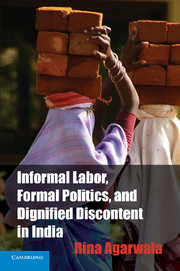Book contents
- Frontmatter
- Contents
- List of Tables
- List of Figures
- Acknowledgments
- Abbreviations
- 1 Introduction
- 2 Struggling with Informality
- 3 The Success of Competitive Populism
- 4 Communism's Resistance to Change
- 5 The Minimal Gains of Accommodation
- 6 Conclusion
- Appendix I Photos of Informal Workers in Construction and Bidi
- Appendix II The Evolution of the Count of Informal Workers
- Appendix III Interview Methodology
- References
- Index
1 - Introduction
Informal Labor and Formal Politics
Published online by Cambridge University Press: 05 March 2013
- Frontmatter
- Contents
- List of Tables
- List of Figures
- Acknowledgments
- Abbreviations
- 1 Introduction
- 2 Struggling with Informality
- 3 The Success of Competitive Populism
- 4 Communism's Resistance to Change
- 5 The Minimal Gains of Accommodation
- 6 Conclusion
- Appendix I Photos of Informal Workers in Construction and Bidi
- Appendix II The Evolution of the Count of Informal Workers
- Appendix III Interview Methodology
- References
- Index
Summary
“Listen sister, we are just poor folks who work to put bread in our stomachs. We can't do anything else. If we ask for more, we lose our jobs. If we lose our jobs, we will die,” explained Basama, an unskilled construction worker in Mumbai, India. Basama's statement reflects a sentiment of vulnerability often heard among poor, informal workers in India. Informal workers produce legal goods and services but engage in operations that are not legally registered. Therefore, unlike formal workers, informal workers are not officially recognized by their employers, and they are not regulated or protected by fiscal, health, and labor laws. Although some work at home or in unregistered subcontractors’ workshops, others operate openly on the employers’ site or in a public space (such as the street). As a result of receiving decreased protection, informal workers usually work in harsh conditions, with low levels of technology and capital, and no labor rights.
In most developing countries, informal labor – labor that is not formally protected – represents the majority of the labor force. In India, informal workers comprise 93 percent of the labor force or 82 percent of the nonagricultural labor force. This informal labor is central to contemporary economies. Informal workers construct buildings, build roads, grow and sell fruits and vegetables, clean homes and streets, sew clothes, weld car parts, and make shoes – not to mention the boxes they come in. Despite early predictions of its eventual demise, informal labor has remained entrenched in poor countries and has even shown signs of growing in rich countries. During the 1980s and 1990s, the world's informal labor force grew as economies expanded and global employment increased by 30 percent (ILO 2008). After the 2008 financial crisis shook the world, the need for low-cost, flexible informal labor was predicted to increase even more (Koba 2009). The undeniable fact is that unregulated, unprotected workers can no longer be viewed as marginal or temporary. Yet, despite their significance, informal workers continue to live in dire poverty and insecurity.
- Type
- Chapter
- Information
- Publisher: Cambridge University PressPrint publication year: 2013



